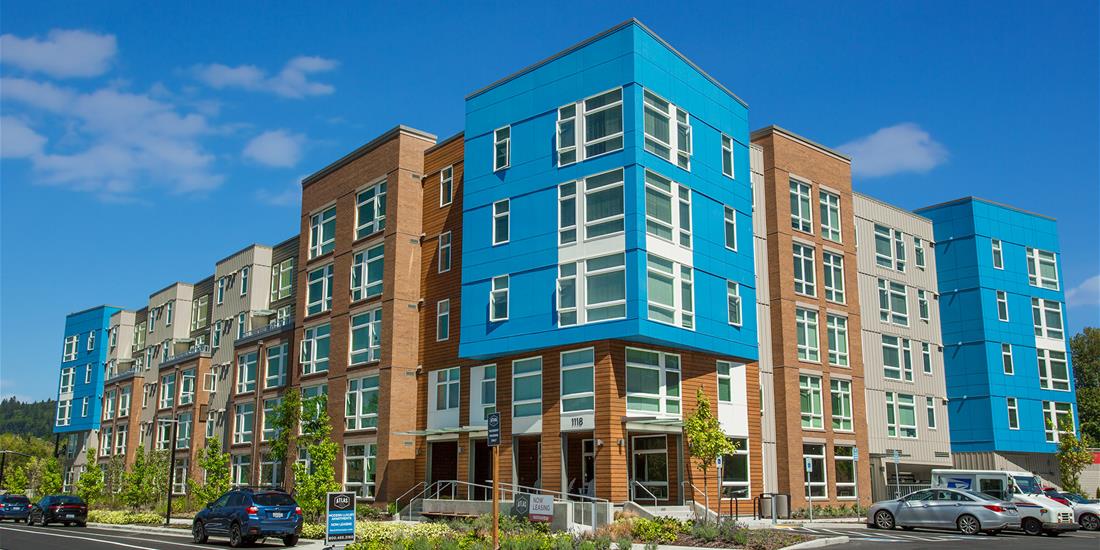Halting development to slow growth? It’s a bold strategy, Cotton, let’s see if it pays off for ‘em.
If a building clad in a color you didn’t think fit your city’s personality suddenly popped up overnight, would you take action?
That’s what the City of Issaquah did in 2016 when a multi-hued apartment complex started gaining attention for all the wrong reasons. The building in question, the Atlas Apartments, featured colors (including a brazen blue) that many residents deemed unacceptable to their city’s persona. The outcry resulted in an emergency ordinance at the Sept. 6, 2017 council meeting that paused development in the area, the reasoning being that new construction was not meeting the standards of the 2012 Central Issaquah Plan.
On the moratorium, which was extended an additional six months after the original verdict last September, Issaquah Economic Development and Development Services Director Keith Niven stated that the decision was made not to deter future growth but to ensure the right kind of growth for the city.
Critics claimed the Atlas complex served as an example of what the city didn’t want or need, citing its lack of mixed-use ground floor space and unsightly “Orlando architecture.” City leaders instead wanted to see denser projects fit for growth and which add vibrancy to the central Issaquah area. Twenty-one months after the original moratorium, city staff had revamped code to solidify areas such as parking requirements for new development and introduced a design and architectural manual to streamline future project aesthetics—including acceptable colors.
 Atlas Apartments, Issaquah
Atlas Apartments, Issaquah
Development changes also included a plan to help diversify the city’s available housing, including reducing hurdles for accessory dwelling units (ADUs) and experimenting with a tax exemption for multifamily housing.
The moratorium officially ended May 21, and so its effects are yet to be determined. But the underlying question is this: Are moratoriums like the one instituted in Issaquah ultimately beneficial or an unnecessary hindrance to providing much-needed housing? MBAKS Senior Policy Analyst Allison Butcher states the latter, calling halts to facilitate growth a “drastic measure” that won’t do anything but put our region even more behind the effort to give residents the shelter they demand.
“We are obviously continuing to grow at a fast pace and instituting a building moratorium isn’t going to stop that,” says Butcher. “The growth is coming whether there’s a moratorium in place or not.”
That sentiment hasn’t stopped other cities from following suit, however, as cities such as Federal Way, Duvall, North Bend, and Newcastle have all recently adopted moratoriums for a variety of reasons, from reworking zoning standards to policy updates and more.
But the question remains, are these sudden stoppages ultimately preventing the very thing we need in this unprecedented time of growth and home prices?
Butcher further explains the potential backfire our cities could see while instituting construction stoppages, saying, “While a moratorium is legal, it does not mean it is good policy. At a time when demand for housing is far outpacing housing supply, which drives up both home prices and rents and makes housing less attainable, building moratoria certainly are not good for housing. They also are not good for our economy or the families and workers looking for a home closer to job centers. Furthermore, they potentially could run counter to our region’s transportation investments that contemplate the need for more transit-oriented development in certain areas.”
Butcher goes on to address housing affordability and how it relates to moratoriums, stating that “perhaps the biggest problem with building moratoria is that they are counterproductive to solving our housing affordability crisis. Simply put, moratoria are a bad deal for anyone looking for housing—they only make it harder for current and future residents to find a home they can afford.”
Butcher also says that stoppages also lose significant revenue from new construction, as participating cities become devoid of local income, taxes, and other benefits to new housing. Her solution? “Instead of enacting policies designed to slow or halt housing, local governments should work within their communities to expand housing supply and choices for families. Housing goes hand in hand with a strong economy and vibrant community.”
Those looking for affordable housing options might not care about a wild blue tint outside their window. Cities must look out for their residents but must also be willing to let growth flourish because, as Butcher points out, the people are coming, and it shouldn’t be our self-imposed lack of available housing that leaves them feeling blue.